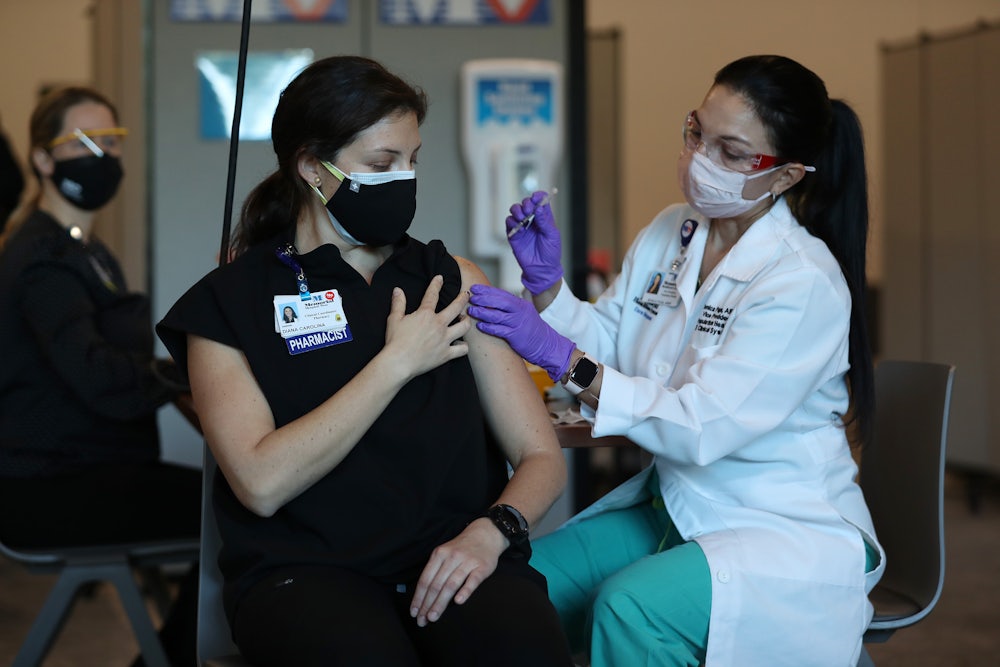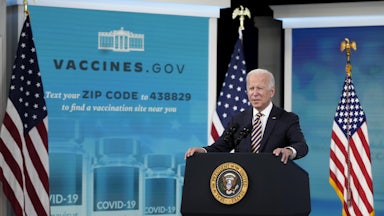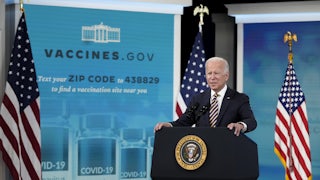Last September, shortly after President Joe Biden announced a slate of new executive orders requiring, among other things, federal employees to be vaccinated, House Majority Leader Kevin McCarthy condemned the move on Twitter. “NO VACCINE MANDATES,” the California congressman wrote. Mississippi Governor Tate Reeves acknowledged that the vaccine was “life-saving” but seethed about Biden’s decision, referring to it as “terrifying” and adding this strange addendum: “This is still America and we still believe in freedom from tyrants.” South Carolina Governor Henry McMaster, meanwhile, tweeted that he would fight the mandates to “the gates of hell.”
These melodramatic levels of cynicism in the GOP’s war on the Covid-19 mandates were breathtaking, even if they weren’t particularly surprising. The party’s leaders gleefully abdicated their responsibilities to public health and blatantly ignored the obvious benefits of the mandates. A macabre political calculus was at work: The virus’s persistence was bad for Biden and his party, which means that the mayhem was, by extension, good for Republicans seeking to overturn Democrats’ slim majorities in both houses. Some natural consequences followed: Along the way, a sizable portion of the Republican base became convinced that the vaccine was a sinister plot from a cabal of globalists, satanists, and/or other sinister forces. Having long since given up on reigning in the enormous lunatic wing of their party, Republican leaders had, particularly after the rise of Donald Trump, begun actively catering to it.
From a raw political perspective, the decision to go all in on conspiratorial insanity has been a remarkable success. Faced with an enormous backlash against any action aimed at restraining the pandemic, the Biden administration has largely demurred. Republicans have managed to avoid much blame for Covid-19’s persistent devastation, while there is some evidence that the Biden administration has been punished for not doing enough to end the pandemic.
Vaccine mandates, meanwhile, remain moderately popular—polling from January found that 53 percent favored the administration’s mandates for health care workers, with 48 favoring mandates for employers with 100 or more workers. (Thirty-five and 38 percent objected, per the polling from YouGov.) And yet, resistance to the mandates from the political fringes effectively stopped the Biden administration’s efforts to stop the pandemic in its tracks. From a public health and a moral perspective, it has been a catastrophe: Hundreds are dying daily from the virus, booster uptake has been abysmally low, and the United States remains exceptionally vulnerable to new variants.
But the GOP’s embrace of these common-sense shredding tropes is having dire knock-on effects well beyond the immediate Covid crisis. There are signs that the country is becoming increasingly vulnerable to older diseases that were conquered in prior public health campaigns as resistance to the Covid-19 vaccine breeds a similar skepticism toward other vaccinations. On Monday, Politico reported that parents and officials in 10 states were increasingly worried about vaccine uptake for shots for measles, chicken pox, meningitis and other diseases that have been generally contained for decades.
Per Politico, “In 2020, the Centers for Disease Control and Prevention saw a 15 percent drop from prepandemic levels in states’ orders for Vaccines for Children, the federal program through which about half the children in the country are immunized. In 2021, order levels were about 7 percent lower than prepandemic levels, according to the CDC.” In Florida, rates for routine immunizations for two-year-olds fell from 92.1 percent in 2019 to 79.3 percent in 2021. In Tennessee, “14 percent fewer vaccine doses were given to children under two in 2020 and 2021 than before the pandemic.” In Idaho, meanwhile, “the number of kids who received their first dose of the measles, mumps, and rubella (MMR) vaccine by age two decreased from roughly 21,000 in 2018 and 2019 to 17,000 in 2021.”
It’s likely that some of this drop-off relates to fears about the ongoing pandemic—specifically, with taking yet-to-be-vaccinated children to the doctor’s office, where there is additional risk of exposure to Covid. But these numbers also suggest that opposition to the Covid-19 vaccine is fueling resistance against other vaccines, potentially precipitating additional public health crises down the line. “I would have told you in April 2020 that that was going to actually be our moment to turn the anti-vaccine tide,” Melissa Wervey Arnold, CEO of the Ohio Chapter of the American Academy of Pediatrics, told Politico. “Unfortunately, instead, the freedom movement took over.”
Alabama pediatrician Nola Jean Ernest, meanwhile, explained that Covid-19 vaccine skepticism was acting almost like a gateway drug for full-blown anti-vax opinions. “Parents are beginning to come in with those same questions they had with the Covid-19 vaccine,” she said. “‘Is it worth it? Do my kids need this vaccine?’ That is the hesitancy that is starting to blossom.”
These early data points suggest a long-tail risk from the pandemic. Over the last year, misinformation about the virus has flourished. It has, at the same time, been egged on by enterprising Republicans seeking to damage the Biden administration. Criticism of Covid-19 vaccine mandates has been spread widely and vaguely, often with the argument that such mandates are un-American and unconstitutional. This is patently untrue. In fact, many states where governors have criticized the mandates, like Mississippi, have strict mandates regarding childhood vaccines. This is the inevitable result of a concerted, bad-faith effort to misinform the public about the Covid-19 vaccine. The damage has already been profound. But it is beginning to look like the impact of these cynical campaigns against public health will persist long after the pandemic ends—if the pandemic ends. And if these vaccination trends continue, we might end up reversing the public health victories of decades past.










